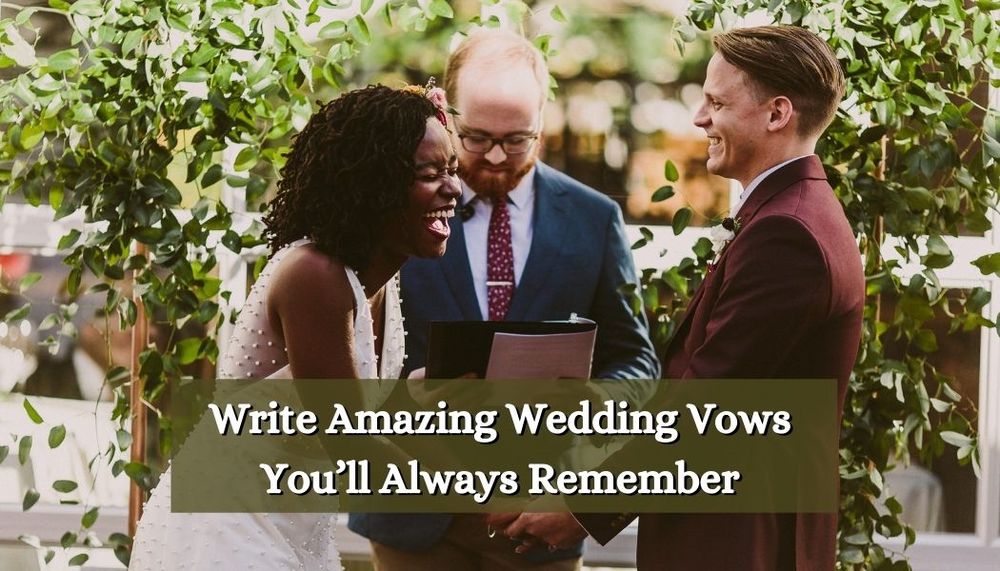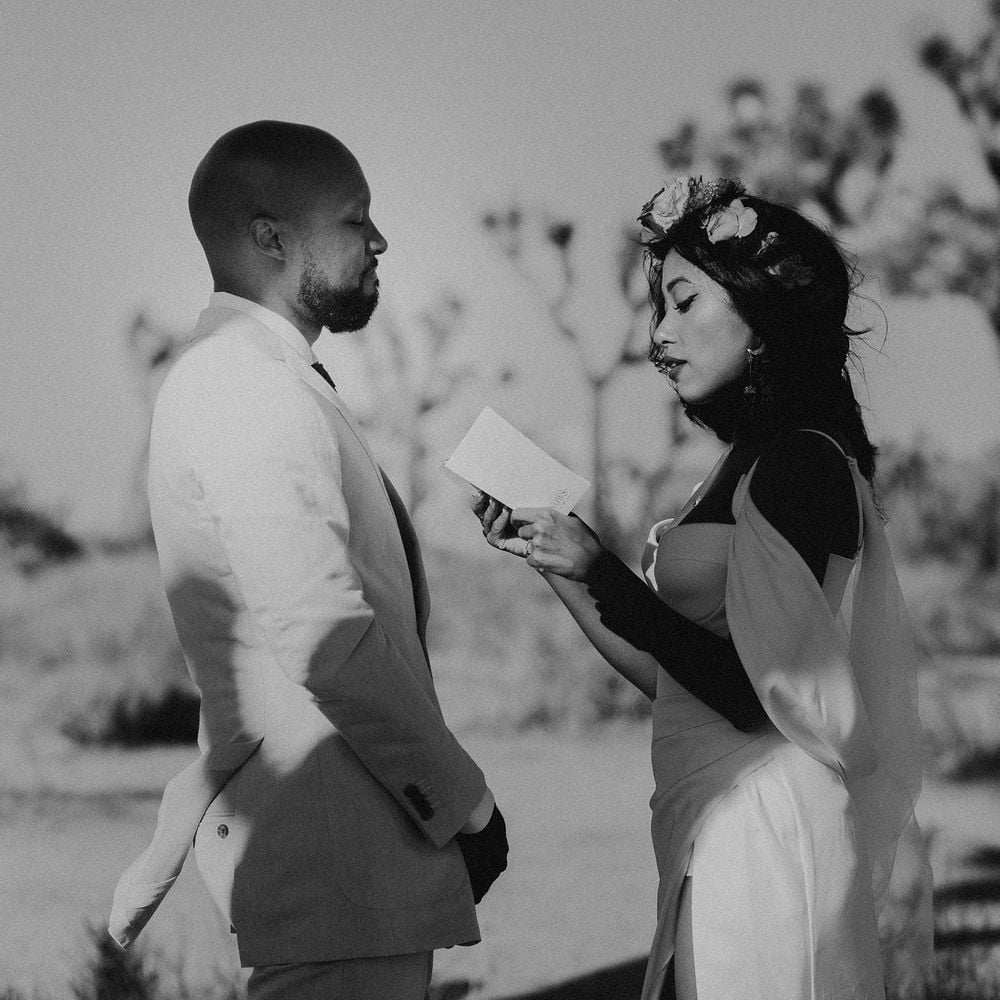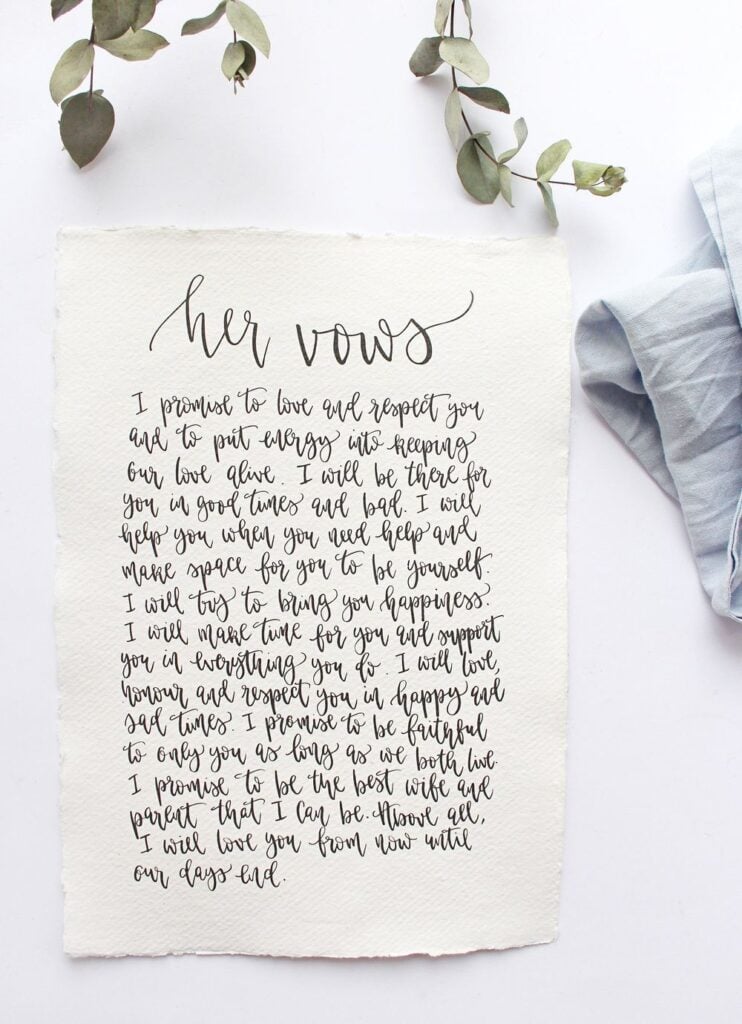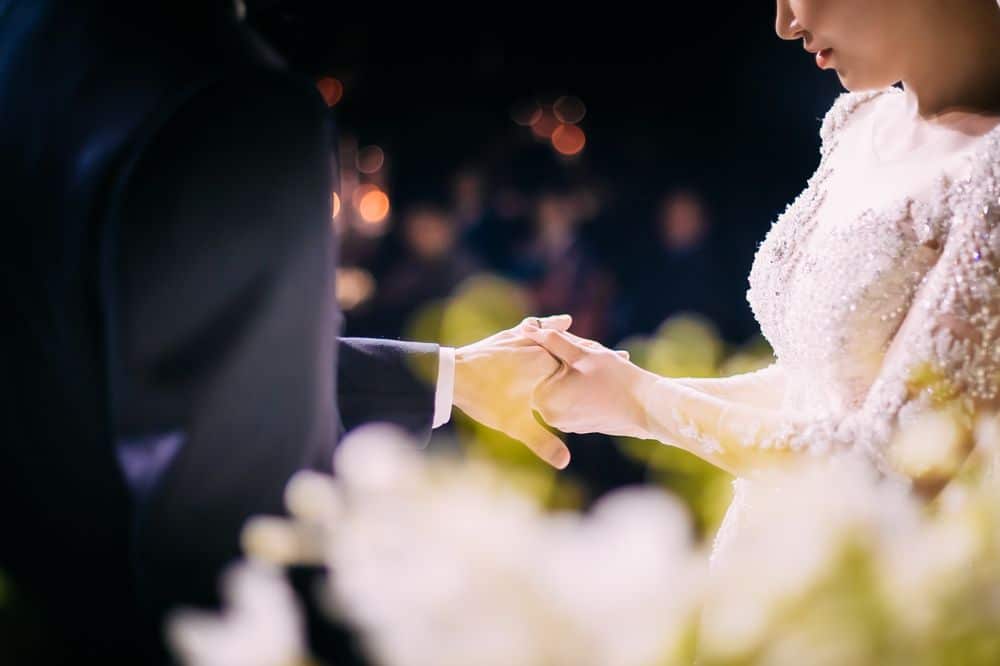
Nothing says I love you more than getting married and entering into a lifelong commitment with your partner. The most important part of the ceremony is the vows you make as a couple. It’s become quite commonplace to create and write your vows, rather than repeating the traditional church or magistrate lines that people have said for hundreds of years.
However, for many couples, this is a daunting and challenging task. What do you include? Should they be funny? Serious? Do they need to be romantic? What stories should we have, if any? There are a lot of questions that you both need to answer to get exactly what you both want out of your handwritten vows. It’s not as simple as just right something cutesy and makes a few silly promises, and then you’re done.
Writing memorable vows can be broken down into three phases: Planning, writing and editing, and practising reciting them. Without these three key stages, your vows will be lacklustre and more than likely be forgotten by the wayside.
So, why is planning your vows so important?

Table of Contents
Planning how you will write your vows
Weddings are stressful enough. An excellent way to help ease pre-wedding day stress is not waiting until the last second to write your wedding vows. Instead, make sure you leave plenty of time to plan, write, edit, rewrite, and practise reciting your beautiful vows. Your wedding vows are essential promises that you are making for life. They deserve to be written with great care, and you cannot do that the night before you are married. Leaving enough time allows for writer’s block to clear and several check-ins with your spouse to be. It also will allow for plenty of time to rewrite and rehearse your vows so that you can say them with ease on the day of your wedding.
Next, sit down with your fiancé and go over the logistics of how you want your vows to feel and sound on the big day. It’s best to come to a consensus here, as you want to avoid causing any upset while reciting your vows at the ceremony. Remember, this is about joining together as a team. Do you want your vows to include the same promises? Do you want to write them together or separately and keep them a secret until the big day? Work together and agree on the logistics ahead of time for how your vows should feel and sound. This will help you plan your vows more easily.
What to include (and exclude) in your vows.
While you are in the planning stage, you and your fiancé should also think heavily about the content of your vows and what you both wish to include or exclude when you sit down to write them. Here are some tips to bear in mind:
- Make a list of what you want to include.
Before you write your first draft, make a list of the absolute must be mentioned things in your vows. It’s astonishing how often couples forget to say ‘I love you’ to their partners in their vows. Leave nothing to chance or memory, and make sure you list what you want to include.
- Don’t embarrass yourselves or your partner in your vows
If you love your partner, then, generally speaking, avoid embarrassing them in front of your families and friends. This should go without saying. A good rule to follow here is if you wouldn’t say it in front of your grandma, then you don’t say it all, or in this case, write it in your wedding vows. Then, your future spouse will thank you for it.

- Make sure you make some promises in your vows.
A lot of couples forget to include promises to each other when they write their vows. A vow is a promise and is the main point of having wedding vows in the first place. Make sure to decide on a few critical contracts that you can follow through on all-encompassing and include some specific ones. Try and avoid using the words ‘always’ and ‘never’ as you can rarely live up to those words.
- Remember the future
Chances are, you will be with this person for the rest of your life. Acknowledging that you see a long future ahead of you both in your vows makes good sense. Why else would you agree to marry your partner in the first place if you couldn’t see a future with them? Include a shared life goal or share a dream you both have for the future in your vows.
- Remember things may get tough
A smooth future is never guaranteed, and it might be worth making a statement about what you will do and how you will react when the going gets tough in your marriage.
Writing your vows-the ins and outs.
After you have planned out how and what to include in your vows, next, it’s time to sit down and write them, below are some great tips to help you get your vows out of your head and onto a page.
- Write three drafts of your vows minimum.
You will not write a perfect first draft of your wedding vows in one go. Create your first draft, then give it a few days, come back and reread them. Then rewrite them again, with all of your changes. Walk away again, maybe for a few weeks or a few months if you have the time to do so. Then follow the above steps again, writing them out for a third and final time. You want to edit your vows but not continually change them as it leads to its own set of problems.
If you have a trusted friend who is good at editing have them look over your vows to catch any mistakes that you might have missed is always a great option.

- Go for sentimentality -it is a wedding after all.
Hopefully, you are marrying the partner of your dreams. It’s ok to speak from the heart and express how much they mean to you. When you express yourself from your heart, you will never go wrong and never come off cheesy.
- Avoid clichés
When writing your vows, don’t use clichés. They are already massively overused, and it comes off as a form of indifference or insincere in your vows to your partner. But, again, this is a good thing to edit out when you go back through your first two drafts.
- Keep your vows to under two minutes maximum
While editing your second draft, set a timer and time yourself reading your vows. If they are over two minutes, go back through and try and pare them down to under two minutes. You want to keep your vows short, sweet, and to the point and not bore your guests with a fifteen-minute ballad of your partner’s more delicate characteristics. Your family will thank you for it.
- Make a fresh copy of your vows come time for the actual ceremony
When it comes time to write out your vows for the final time, write them entirely out on a fresh piece of paper or note cards, you want them to look clean and be legible and easily readable. Chances are you will be nervous and stressed out beyond belief at your wedding. Trying to look at little notes or remember your vows from memory will more than likely backfire, and you will be left sputtering and stumbling trying to remember what you wrote.

You have finished your vows, now what? Practise reciting them so they are perfect.
Don’t wait to the moment when you will recite your vows during your wedding ceremony to read your vows out loud for the first time. If you get stage fright, you want to factor in time to practise so you do not freeze up on your big day. So practise reciting your vows several times before your ceremony. Here are few things to think about:
- Practise saying your vows alone at first
Practice saying your vows in front of the mirror alone, focusing on where you want to pause and inflect your speech to make the most impact. Using a mirror can help you make sure you are smiling and not pulling odd faces.
- Ask a few close friends to listen and give pointers.
Have a few close friends and family listen to you say your vows. Listen to their feedback and make any last-minute adjustments to how you are reciting your vows, and continue practising until the big day.
Writing memorable wedding vows is why couples choose to write their vows. These tips will help you plan and create the perfect vows you and your spouse will remember for now, always and forever.
Summary of Writing Your Wedding Vows
- Plan ahead and leave enough time to write, edit, and rehearse your vows.
- Work with your fiancé to agree on the logistics of the vows and how they should feel and sound.
- Make a list of what to include and exclude, including promises to each other, love, future together, handling tough times, and avoiding embarrassing your partner.
- Write at least three drafts and get feedback from a trusted friend if needed.
- Express yourself from the heart but avoid clichés.
- Keep your vows under two minutes, short, sweet, and to the point.
FAQ – Wedding Vows
What should a couple’s wedding vows say?
“No matter what the future holds, I pledge to always be true and your closest friend.” “I swear I’ll always be rooting for you, cheering you on, and being your biggest supporter.” “I swear I’ll always love and support you.” “I swear I’ll spend the rest of my life adoring you.”
What is the ideal length of a vow?
Wedding vows should be between 45 seconds and 2 minutes in length on average. Traditional vows between your priest, pastor, or another wedding officiant usually run no more than two minutes, although it might be longer if you have a more religious service.
What is a good way to conclude wedding vows examples?
“This is my holy oath.” “From now till the end of my days, I shall adore you.” “I can’t wait to spend the rest of my life with you because loving you is the finest thing that has ever happened to me.” “You will always have my heart and soul.”
Do your vows need to be memorized?
If the idea of writing your own vows makes you nervous, there’s nothing wrong with saying the words that your officiant has prepared for you. You won’t have to worry about memorization if you choose this path. (Just remember to pay attention when it’s your turn to repeat the vows.)
Is it necessary for you to create your own vows?
Writing custom vows allows you to express your love for one another in your own words. When it comes to crafting vows, there are no rules. Consider doing both if you can’t determine whether or not to write your own.













